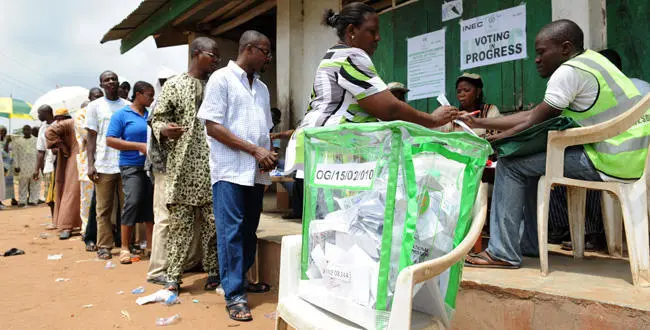As Nigerians eagerly await the outcome of the Presidential and National Assembly election held last weekend, apprehension is beginning to hold the nation in a vice-like grip. For the political class, the dread of failure after the high stakes is strangulating enough. For the majority of other Nigerians who cast their votes, it is more of the fear of the unknown. In the midst of it all is a pervasive tensed feeling that is so palpable.
In the aftermath of this situation, comments, opinion and predictions have become commonplace. In the opinion of this newspaper, some of these utterances are not helping the already charged atmosphere. To that extent, we are compelled by the demands of national peace and cohesion to admonish politicians, clergymen, and elder statesmen to be more restrained on how they react to issues at this time.
In our view, it is important for all stakeholders involved to approach the process with cool heads. The stakes are high and emotions are running even higher. The last thing that Nigeria needs right now is inciting statements from politicians, clergymen, and elder statesmen that could heighten tensions and threaten the peace and stability of the country.
Already there are, in the media space, statements calling for mass protests and military takeover. We assume that these are comments by those who, afraid to lose in the political game they believe that they have invested so much, see a military takeover as a way out without meaning it in serious terms. To this set of Nigerians, it is imperative to remind them that politics in a democratic setting is a game with winners and losers. There will always be a return match with prospects of victory for today’s losers.
In the circumstances that the nation finds itself, the spread of fake news on conventional and social media is decidedly unhelpful to the efforts to nurture and grow the democratic process in spite of its inadequacies. Those behind such incendiary tendencies are sufficiently educated, politically enough, to appreciate the fact that in the present-day world, military incursion into governance with all its attraction, if any, is nothing compared with the worst of democracy.
In the run-up to this ongoing election, there were evidences of extreme divergent views as were to be expected in any political contest even in advanced democracies. It is normal under such situations for groups to push their respective agenda and candidates forcefully into the political space with the intention of presenting themselves before the electorate as better qualified to be elected into office. There were genuine fears that, given Nigeria’s geopolitical fault lines, such could lead to violence as were prevalent in previous elections.
In the face of all this, the last thing we want as Nigerians is a descent to chaos, as had happened in other African countries. It is essential, therefore, that everyone involved in the election process acts responsibly and avoids making statements that could inflame passions and fuel violence.
Politicians, in particular, must tread carefully. They are the ones most likely to be tempted to use untoward language to whip up support for their candidates. However, they must remember that they have a responsibility to the Nigerian people and that includes maintaining the peace and stability of the country. Politicians must, therefore, resist the urge to make statements that could incite violence.
On the part of clergymen and other religious leaders, they must accept that they have a significant role to play in ensuring that the election process is peaceful. They must use their positions to promote messages of peace, unity, and tolerance. They should avoid making statements that could be interpreted as taking sides, and instead focus on calling for calm and non-violence. Religious leaders are often seen as trusted figures in their communities, and their words carry a lot of weight. They must use this influence wisely and responsibly.
For the elder statesmen most of whom have been around long enough to witness Nigeria’s political evolution and understand the consequences of incitement and violence. They must, therefore, use their experience to advise and guide the younger generation of politicians and voters. They should act as mediators in any disputes that may arise and help to resolve them amicably. Elder statesmen must also use their influence to urge politicians and their supporters to exercise restraints in the face of obvious provocation.
Furthermore, in our considered opinion, Nigeria cannot afford to have another election cycle marred by violence and unrest. We need cool heads, responsible leadership, and a commitment to peaceful and transparent elections. Politicians, religious leaders, elder statesmen, and the media all have a role to play in ensuring that the election process is peaceful. They must not indulge in behaviours that could incite violence and instead focus on promoting messages of peace, unity, and tolerance.





